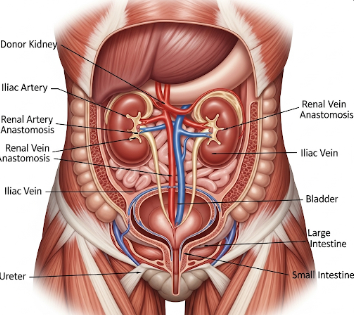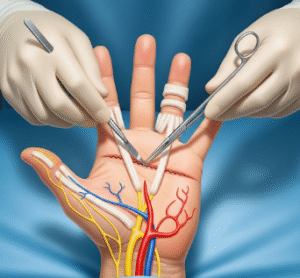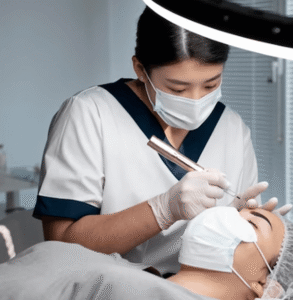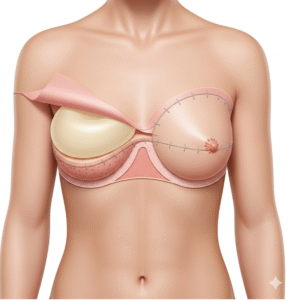Overview
Kidney donation is a surgical procedure in which a healthy individual donates one of their kidneys to a patient with kidney failure. It can be living donor donation or deceased donor donation, depending on availability and patient needs.
South Korea is known for advanced transplantation programs, highly skilled surgeons, and comprehensive donor care, making it a leading destination for patients seeking safe, ethical, and life-saving kidney transplants.
What is Kidney Donation?
Kidney donation involves:
- Removal of a healthy kidney from a donor
- Transplantation into a patient with end-stage renal disease (ESRD)
- Restoration of kidney function for the recipient
Types of donation:
- Living donation → Donor is alive; kidney usually comes from a relative or compatible volunteer
- Deceased donation → Kidney comes from a recently deceased donor who consented for organ donation
Purpose:
- Save the life of patients with kidney failure
- Reduce dependency on dialysis
- Improve quality of life and long-term survival
What are the Benefits?
For Recipients:
- Restored kidney function → Eliminates or reduces dialysis
- Improved quality of life → Greater energy, better overall health, and fewer dietary restrictions
- Better long-term survival → Living donor transplants often have longer graft survival than deceased donor transplants
For Donors:
- Ability to save a life → Significant psychological reward and satisfaction
- Minimal long-term health impact → Healthy donors can live normal lives with one kidney
- Rigorous screening ensures safety → Pre-operative tests ensure donor eligibility and low risk
Procedure Details
1) How should I prepare for kidney donation?
- Pre-donation evaluation → Blood tests, kidney function tests, imaging studies, and compatibility testing
- Medical clearance → Cardiovascular, respiratory, and general health assessment
- Psychological assessment → Ensure the donor understands risks and motivations
- Medication review → Avoid blood thinners or medications affecting kidney function
- Pre-procedure consultation → Discuss surgical steps, anesthesia, recovery, and potential complications
2) What happens during the procedure?
- Anesthesia → General anesthesia for comfort and safety
- Surgical approach →
- Laparoscopic nephrectomy (most common) → Small abdominal incisions, minimally invasive
- Open nephrectomy → Larger incision, used in complex cases
- Kidney removal → Donor kidney carefully extracted and flushed with preservation solution
- Closure of incisions → Sutures or surgical staples; incision healing monitored
- Duration → 2–4 hours depending on approach and patient anatomy
- Monitoring → Continuous vital signs, urine output, and blood pressure monitoring
3) What happens after surgery?
- Immediate post-operative care → Observation in recovery room and hospital for 2–3 days
- Pain management → Analgesics and supportive care for incision discomfort
- Activity restrictions → Avoid heavy lifting and strenuous exercise for 4–6 weeks
- Follow-up visits → Blood tests, kidney function assessment, and incision monitoring
- Lifestyle advice → Maintain hydration, healthy diet, and regular exercise
Risks / Benefits
Risks for Donors
- ➤ Pain and discomfort at incision site
- ➤ Bleeding or infection
- ➤ Rare injury to surrounding organs
- ➤ Possible long-term kidney function reduction (very rare)
Benefits for Donors
- ➤ Life-saving contribution for recipient
- ➤ Minimal long-term health impact with proper screening
- ➤ Psychological satisfaction and social contribution
- ➤ High safety under expert Korean surgical teams
Risks for Recipients
- ➤ Organ rejection
- ➤ Infection due to immunosuppression
- ➤ Surgical complications (bleeding, urine leakage)
Benefits for Recipients
- ➤ Restores kidney function and eliminates dialysis dependency
- ➤ Improves quality of life and survival rates
- ➤ Better outcomes with living donor kidneys
Recovery and Outlook
- Donor recovery → Most donors return to normal activities within 4–6 weeks
- Recipient recovery → Hospital stay 5–10 days; gradual increase in activity
- Long-term follow-up → Regular kidney function tests and lifestyle monitoring for both donor and recipient
- Expected outcomes →
- Donor maintains normal health with one kidney
- Recipient achieves functional kidney, reduced dialysis needs, and improved quality of life
- Post-procedure care → Adherence to medications, healthy lifestyle, and routine medical check-ups
South Korea provides expert surgical care, post-operative monitoring, and patient education for both donors and recipients, ensuring safety, successful outcomes, and long-term health.
When To Call the Doctor
For Donors:
- ⚠️ Excessive bleeding or swelling at incision site
- ⚠️ Fever or signs of infection
- ⚠️ Severe abdominal pain or nausea
For Recipients:
- ⚠️ Decreased urine output or swelling
- ⚠️ Signs of organ rejection (fatigue, nausea, unusual pain, or fever)
- ⚠️ Infection symptoms (fever, chills, or redness at surgical site)
Best Korea Option / Process
South Korea is a leading destination for kidney donation and transplantation due to:
- Expert transplant surgeons and nephrologists
- Advanced laparoscopic and minimally invasive techniques
- Comprehensive donor and recipient care → Pre-op screening, surgery, and long-term follow-up
- Multidisciplinary support → Nutrition, immunology, and psychosocial care
- International patient services → Consultation, scheduling, translation, and follow-up
Top Hospitals for Kidney Donation and Transplant in Korea:
- Asan Medical Center, Seoul – Leading organ transplant program and donor safety protocols
- Samsung Medical Center – Advanced surgical techniques and post-op monitoring
- Seoul National University Hospital (SNUH) – Multidisciplinary transplant care for donors and recipients
- Yonsei Severance Hospital – Comprehensive living and deceased donor kidney transplant services
👉 For patients seeking safe kidney donation and transplantation, South Korea offers expert care, minimally invasive surgery, and high long-term success rates.













